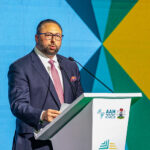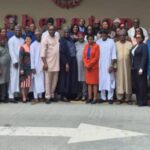Group seeks increased budgetary allocation to water sector
By Florence Onuegbu
The Corporate Accountability and Public Participation Africa (CAPPA), a non governmental organisation (NGO), has called on government at all levels to increase budgetary allocation to the water sector.
The Executive Director of CAPPA, Mr Akinbode Oluwafemi made the call on Friday in Lagos, at a news conference to mark the 2024 World Water Day.
Oluwafemi said that increased budgetary allocation would help to revitalise the water sector, hence,improve access to potable water in the various communities.
“This also includes refurbishing dilapidated infrastructure, upgrading existing water works and building new facilities, to ensure widespread access to clean and safe drinking water,” he said.

According to him, the year 2024 World Water Day with the theme – ”Water for Peace”, underscores the critical necessity of water for human survival and societal stability.
He called on the government to stop any ongoing or future plans to privatise water services, as it had been stated repeatedly and demonstrated globally that public-private partnerships offered no real solutions to water challenges.
Oluwafemi said that water corporations across the country must fulfill their responsibility of public water distribution across all areas, not just economically viable neighbourhoods.
He said that government must strengthen regulatory oversight and implement proper reparation mechanisms in local communities affected by water injustices like contamination, scarcity, and inaccessibility.
“These mechanisms should include measures by state ministries of health to address the consequences of prolonged exposure to contaminated water, especially for women and girls.
“Governments must support and protect water sector workers by reversing any layoff plans, enhancing water infrastructure conditions, and ensuring adequate wages, along with comprehensive training programmes to improve their skills and performance,” the director said.
He said that above all, the government must foster a participatory approach to water governance that prioritises the voices and needs of local communities into decision-making processes related to water management.
According to him, in Nigeria alone, a staggering 113 million people suffer from painful hardship and crippling deprivation of water.
“This saddening neglect is not due to a scarcity of resources ,but rather a consequence of the profit-driven logic adopted by state authorities in managing water supply and amenities.
“The relentless pursuit of commodifying public resources, at the expense of community welfare, has led to the deterioration of vital public utilities and social services,” he said.
Also, Zikora Ibeh, Policy and Research Analyst, CAPPA, said that across the country, people were languishing without water and it was worse for women and girls who use water for many of the things they had to do in their household
“Water is a basic right that should not even be begged for you, but then, you see people having to use contaminated water, dirty water, it is just shameful,” Ibeh said.
Gbemisola Ahmed, a member of the Amalgamated Union of Public Corporation, Civil Service Technical and Recreational Services (AUPCTRE), said that the theme underscored the global recognition of water as a critical driver for collective peace and security around the world.
Ahmed, who spoke on behalf of the Our Water Our Right Africa Coalition (OWORAC), said that reliable access to safe and affordable drinking water was essential for the stability of communities.
“This is especially true for women and girls across Africa, whose daily reality and security is deeply connected to the availability of water and sanitation services,” she said. (NAN)(www.nannews.ng)
Edited by Buhari Bolaji
Published By
Has also recently published
 Economy/BusinessJuly 3, 2025Jason Miller outlines Trump’s Africa trade vision
Economy/BusinessJuly 3, 2025Jason Miller outlines Trump’s Africa trade vision General NewsJuly 3, 2025Structured finance evolving to meet Africa’s changing economic landscape – Oramah
General NewsJuly 3, 2025Structured finance evolving to meet Africa’s changing economic landscape – Oramah HealthJuly 3, 2025Lawmakers call for end to foreign dependencies in health financing
HealthJuly 3, 2025Lawmakers call for end to foreign dependencies in health financing Culture & TourismJuly 3, 2025Don calls for investment in tourism to reduce oil dependency, boost economy
Culture & TourismJuly 3, 2025Don calls for investment in tourism to reduce oil dependency, boost economy




